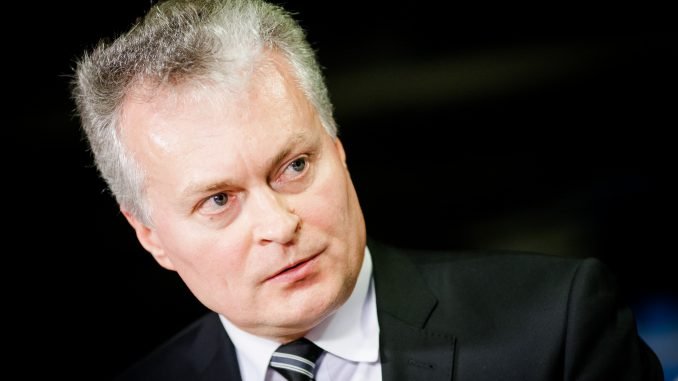
“The big neighbour is actively working and achieves the most where the darkest shadows lie. Our duty is to always and everywhere bring more light,” President Gitanas Nausėda said at the annual Valdas Adamkus Conference when speaking about the European Union’s Eastern Partnership Programme and Russian aggression.
In the third V. Adamkus Conference, which started on Thursday, the main attention was focused on the importance of EU membership for Ukraine, Georgia and Moldova, Viktorija Rimaitė lrytas.lt .
V. Adamkus – a teacher and an example
Starting his speech, President G. Nausėda celebrated the opportunity to participate in former President V. Adamkus’ conference.
“I want to celebrate the opportunity to have a word in V. Adamkus’ conference. I viewed him as a teacher, from whom I drew experience. V. Adamkus was always an example for me, seeking closer partnership in foreign policy,” G. Nausėda started his speech.
Baltic Way and the pursuit of Euro-Atlantic partnership
On the eve of the Baltic Way, G. Nausėda recalled this event’s importance for Lithuanian history. However, according to the president, even having achieved the goals of EU and NATO membership set thirty years ago, we cannot feel safe.
“Tomorrow, we will once more commemorate the 80th anniversary of the Molotov-Ribbentrop Pact and the 30th anniversary of the Baltic Way. It is an excellent jumping-off point from the past, an opportunity to review lessons learnt. […] The essence of the Baltic Way was not abstract talks about the loss of freedom. The Sąjūdis demanded the occupying forces be withdrawn. This not only helped seek freedom but also drew a trajectory for achieving it.
The Baltic States were the first to clearly declare their Euro-Atlantic integration pursuit. Today, Lithuania is a member of both the EU and NATO, however, we cannot feel completely secure as long as a post-imperialist Russian regime operates in our neighbourhood, as long as assault weaponry continues to be assembled on our doorstep in Kaliningrad and in Eastern Ukraine, bloody military conflict is continued. We cannot feel safe as long as our neighbours feel unsafe,” G. Nausėda emphasised.
More light
President G. Nausėda expressed firm support for Ukrainian, Georgian and Moldovan EU membership.
“We must nurture a culture of dialogue, employing the idea of Europe as did the Baltic States several decades ago. We know well that our partners’ efforts to progress face new challenges. Up to now, nothing has been done to halt the aggression in Ukraine.
The big neighbour is actively working and achieves the most where the darkest shadows lie. Our duty is to always and everywhere bring more light,” the president stated in his address.
According to President G. Nausėda, EU and NATO defensive capacities should reinforce one another and the fate and safety of Lithuania and all of the EU will greatly depend on the EU’s Eastward expansion.
“We are at our strongest when without faltering we rely on our common values when we stand together and do not allow our enemies to come in between us. […] We are and will be strong only to the extent that we trust our strength and manage to unite it. […] Let us also dispel the darkness,” G. Nausėda said.
Emphasised Lithuanian and Georgian similarities
Georgian President Salome Zourabichvili emphasised that there are many similarities between Lithuania and Georgia, but admitted that Georgia is significantly behind Lithuania.
“We are two countries on the periphery of Europe, speaking in geographic terms. Both our countries were forcibly integrated into the Russian empire, a Russification policy followed, which ended up only reinforcing national identities in our countries. Independence was recovered, democratic constitutions were approved. At the same time, the League of Nations was formed. Unfortunately, Georgia was occupied once more, after a time you faced the same fate. Also, our paths out of the Russian regime were similar – both our countries freed themselves in 1991,” the Georgian president said.
According to S. Zourabichvili, the main factors due to which her country struggles to draw nearer to Europe are linked to external threats.
“We are behind. There are a number of reasons for this, linked not only with a lack of effort on part of Georgia but also with the overall environment. Everyone understands well, what environment it is. […] We are following behind you, but we are certain that we will continue in your footsteps. We are certain that Georgia will be part of Europe, Georgian history grants us confidence,” the Georgian president spoke on current prospects of EU cooperation.
According to the politician, successful Georgian integration, considering aggressive Russian policy toward the country, needs support from the EU and real financial aid.
“Europe itself is a lesson in optimism. Europe created a unique model of development, a model of voluntary unity – all the countries joined voluntarily, no country was forcibly attached to the union,” S. Zourabichvili commented on the idea of the EU.
Important to do more than we can
One of the initiators and organisers of the now third-year conference, member of Seimas Žygimantas Pavilionis stated that three years ago they launched the conference in order to return ambition to Lithuanian foreign policy.
“We started changes in this region and inspired other countries to follow our example. Some say that the cause of the tragedy is contentment. We must seek to do more than we can […].
We have military and nuclear monsters, which threaten our lives. In recent years, we took up a defensive position, we lacked the unity to change the situation for the better,” Ž. Pavilionis spoke about the conference’s roots.
The MP celebrated that this year the conference rose to the presidential level and thanked President G. Nausėda for opening the doors of the Presidential Palace.
The first V. Adamkus Conference was held in 2017 and was aimed at discussing the transatlantic community’s regional leadership in foreign policy. The main focus of the second conference, which was held in 2018, was on the future of Russia.


Be the first to comment